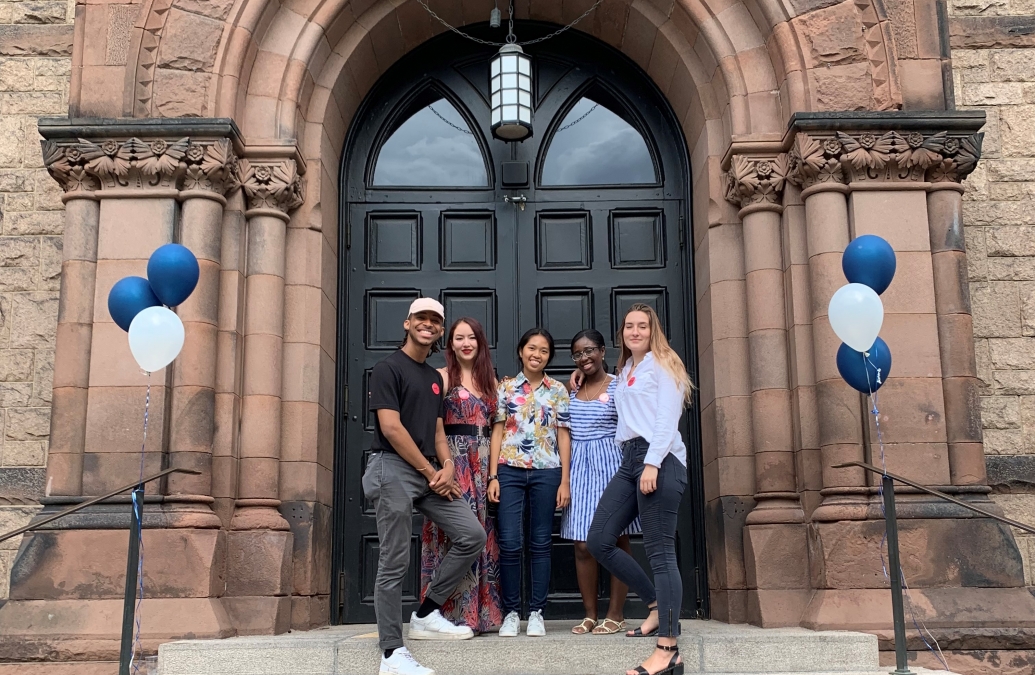Looking Back: Four Years in the Bonner Community Fellowship

At the dining table of my home in Minnesota, I sit with my computer and a cup of coffee. I have been here before. A little less than four years ago, I interviewed for the inaugural Bonner Community Fellowship cohort at Brown University in this exact spot. It was a conversation over Google Hangouts, an experience unexpectedly resonant with this semester’s online courses and meetings. At the time, I was about to begin my undergraduate career. I was about to leave the community that I had lived in most of my life with the goals of learning, growing, and becoming a thoughtful, contributing member of society. The Bonner Community Fellowship was one way that I planned to achieve these goals. Now, at the end of my senior year of university – an end punctuated by a devastating pandemic – I reflect on how the program has shaped me and my time at Brown.
The Bonner Community Fellowship comprises just one branch of a national network of Bonner Programs. The program was introduced at the Swearer Center, Brown University’s hub for community engagement, during the fall of 2016 to offer Brown students the opportunity to engage with the Providence community in a way that is meaningful and sustainable. The program is designed to last all four years of university, during which time fellows dedicate eight to ten hours a week to engaging with a community organization in Rhode Island. Many take on leadership roles or complete complex projects aimed to support their sites long after their university career has ended.
On a personal level, the Bonner Community Fellowship has been so integral to my undergraduate experience that it is difficult to extricate one from the other. It introduced me to students with different concentrations, extracurriculars, and backgrounds, who I likely would have never met otherwise and who became some of my closest friends. It offered us the opportunity to share ideas and support one another’s community engagement and academic work. After one weekly workshop, I recall witnessing a Bonner Community fellow placed with a health resources organization sharing resources with another fellow who wanted to connect individuals experiencing homeless with local nonprofits. I remember studying chemistry with a fellow I’d recognized in the lecture hall, and later receiving guidance from her when I wanted to move from my community site at the Met High School to take on a leadership role at the Swearer Center as a Swearer fellow.
As a dual Literary Arts and Biology concentrator, the Bonner Community Fellowship provided me with insight and analytical skills that guided my path in both fields. The workshops I attended through the Swearer Center taught me about health disparities, issues such as mental illness, and the history of Providence. The program gave context to the concepts I learned in my biology classes and strengthened my calling to medicine. I was able to use my STEM background to develop science workshops at the Met High School, and eventually, as a Swearer fellow, could offer advice to other students planning on pursuing careers in health. In my literary studies, my workshops and experiences at community sites gave me the opportunity to analyze the socio-cultural significance of certain words and made me better aware of how choices of language can strengthen – or hurt – communities. My responsibilities as a Swearer fellow, such as designing workshops for first-year Bonner students and conducting research to develop infrastructure for the program, allowed me to better hone my writing abilities.
But beyond all of the ways that these experiences have positively impacted me, they have changed how I choose to impact the communities around me. Being a Bonner fellow means taking the meaningful course of action over the feel-good course, and being able to tell the difference. Community engagement is too often perceived as solely interventional: an individual entering into a community, providing a service, and leaving. The Swearer Center teaches that every community has strengths, vibrancy, and value. As individuals entering those communities, we have a duty to listen and learn, respecting their experience and allowing their expertise to guide our actions. Communities provide support, resources, and connection. They are networks of individuals all trying to build a better world for one another. Especially in difficult times like the current pandemic, when we are separated physically from one another, the importance of community cannot be understated.
At the end of my undergraduate career, I think of the communities at Brown I’ve been a part of: the University, the Bonner Community Fellowship, the Swearer Center, the Met High School, Providence. They made me who I am, supported me, and allowed me to grow. In turn, I can hope that I did the same and that my projects as a Swearer Fellow and Bonner Community fellow will have a positive effect on the people and places that have meant so much to me. I plan to take this perspective – and the skills I’ve learned – wherever I go next.
